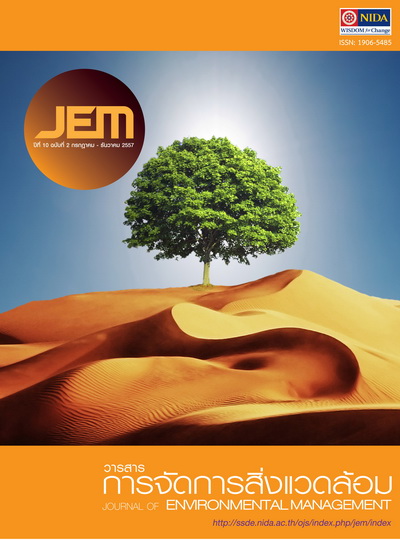การจัดการขยะขององค์กรปกครองส่วนท้องถิ่น: กรณีศึกษา เทศบาลตำบลเมืองแกลง จังหวัดระยอง
บทคัดย่อ
บทคัดย่อ
บทความนี้ศึกษาการบริหารจัดการขยะของเทศบาลตำบลเมืองแกลง จังหวัดระยอง และปัจจัยที่มีผลต่อการบริหารจัดการดังกล่าว จากการสัมภาษณ์และสนทนากลุ่มกับผู้บริหารและเจ้าหน้าที่ที่เกี่ยวข้องกับการจัดการขยะ ผู้นำชุมชนและประชาชนในพื้นที่ รวมทั้งสังเกตการณ์การดำเนินการจัดการขยะ และสภาพพื้นที่ของเทศบาลตำบลเมืองแกลง จังหวัดระยอง วิเคราะห์ปัจจัยความสำเร็จโดยเทคนิคการวิเคราะห์สภาวะแวดล้อม (SWOT Analysis) พบว่า การจัดการขยะของเทศบาลตำบลเมืองแกลง เริ่มต้นจากการรณรงค์ประชาสัมพันธ์ให้ประชาชนได้รับความรู้เรื่องการคัดแยกขยะจากบ้านเรือน เทศบาลมีการคัดแยกขยะ มีการส่งเสริมให้บุคลากรในองค์กรพัฒนาศักยภาพตนเองด้านการจัดการขยะ มีเป้าหมาย ยุทธศาสตร์และโครงการเป็นตัวขับเคลื่อน ใช้มาตรฐาน ISO 14001 ในการทำงานด้านสิ่งแวดล้อม ผู้นำชุมชนและเจ้าหน้าที่เป็นตัวกลางประสานการทำงานระหว่างเทศบาลกับประชาชน ปัจจัยภายในที่มีผลต่อความสำเร็จในการจัดการขยะ ได้แก่ ผู้บริหารมีวิสัยทัศน์กว้างไกล มีวิธีคิดอย่างเป็นระบบ ปฏิบัติงานเชิงประจักษ์ บุคลากรที่เกี่ยวข้องมีความกระตือรือร้นและชำนาญด้านการจัดการขยะ การประยุกต์ใช้ระบบมาตรฐานสากลในการบริหารจัดการด้านสิ่งแวดล้อม นโยบาย/แผน/โครงการยึดหลักการมีส่วนร่วมของประชาชน มีการประชาสัมพันธ์หลายทาง มีวิธีจัดการขยะที่เหมาะสม ปัจจัยภายนอก ได้แก่ ผู้นำชุมชนและประชาชนมีจิตสำนึกในด้านสิ่งแวดล้อม หน่วยงานของรัฐและองค์กรด้านสิ่งแวดล้อมเข้ามาสนับสนุนการพัฒนาการจัดการขยะของเทศบาล
คำสำคัญ: การจัดการขยะ องค์กรปกครองส่วนท้องถิ่น เทศบาลตำบลเมืองแกลง
Abstract
This article examines the solid waste management and factors affecting the success of solid waste management of Muangklang municipality. This study relied on interviews and focus group discussion with administrators, officers, community leaders, local people, and observation of waste management operations in order to analyze the factors affecting the success of solid waste management using SWOT analysis. The results showed that the process of solid waste management of Muangklang municipality begins by distributing knowledge and encouraging local people about waste reduction and separation: the municipality separated the waste, encouraged the staff to develop their capabilities regarding waste management, had a clear target regarding solid waste management, which was mobilized by projects under environmental strategy, and applied ISO 14001 for environmental management. Community leaders were the means for coordination between the municipality and local people. The internal factors affecting the success of solid waste management of Muangklang municipality included the following: the administrators of Muangklang municipality had good vision, systematic thinking, and supported concrete operations; relevant staff were enthusiastic about their skills in solid waste management; the structure of the organization was well-defined by function; the municipality applied international standards for environmental management; the policy/plans/projects emphasized the participation of people; there were several channels to provide knowledge to local people; and the methods of solid waste management were appropriate for the municipality. The external factors were as follows: leaders and local people were enthusiastic about the environment and exhibited good environmental awareness, and government agencies and environmental organizations provided support for the development of solid waste management.
Keywords: Solid Waste Management; Local authority; Muangklang Municipality



